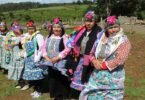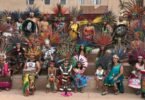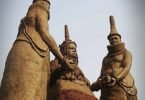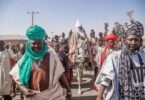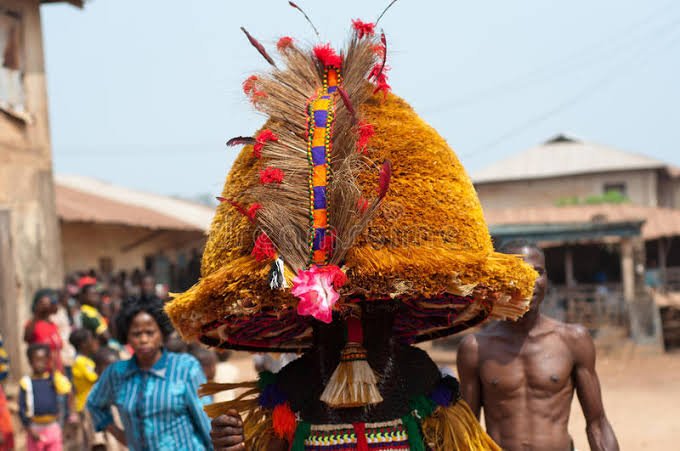
The Ebira people, whose origin is mainly from central Nigeria, especially from Kogi State, have cultures that depict their past, their customs, and their existence. Their customs, dialect, celebrations, and arts have useful cultural values that may benefit the Ebira people, as well as Nigeria and the entire world. All these cultural elements hail identity, socially inclusive community, economic development, and healthy beliefs of native people.
This paper aims to reveal the main cultural values of the Ebira people and their contribution to culture.
1. Promotion of Identity and Pride
The Ebira culture serves as a cornerstone of identity for its people, giving them a sense of belonging and pride.
Benefits:
- Language as a Unifier: The Ebira language (Igbirra) fosters communication and solidarity among the community.
- Traditional Attire: The distinctive Etu fabric, a handwoven indigo-dyed cloth, is a symbol of Ebira heritage and is often worn during important ceremonies, enhancing cultural visibility.
By preserving and promoting these unique aspects, the Ebira people reinforce their cultural identity in a rapidly globalizing world.
2. Festivals as a Source of Unity
Ebira festivals, such as the Eche-Ozi-Eto (New Yam Festival) and the Echane festival, play a vital role in uniting families and communities.
Benefits:
- Cultural Cohesion: Such festivals make people come together, and since they bring them together, they provide an opportunity to address their differences and share happiness and love.
- Intergenerational Knowledge Transfer: This is beneficial in sustaining culture among the young about which elders use festivals to pass knowledge as the group indicated.
- Tourism Opportunities: Festival celebrations culminating in colorful dances, songs and rituals motivate visitors’ participation and encourage tourism.
3. Artistic Contributions to Nigerian Culture
Particularly, weaving, sculpture, and music are famous among the Ebira people who are distinguished for them.
Benefits:
- Economic Empowerment: Original products include the weaving of the Etu fabric, which is an important source of income and also an economic boost to craft makers.
- Cultural Exchange: Ebira artworks and music help the world discover its unique identity that it is important to preserve and expand.
- Preservation of Skills: Being a tradition and influenced by indigenous culture, artistic production continues to enrich a legacy that extends through generations.
4. Rich Oral Traditions and Storytelling
Word of mouth is of huge significance in a traditional Ebiran setting since it is used in the transmission of history, and ethical as well as philosophic knowledge.
Benefits:
- Educational Value: Folktales, proverbs, and songs teach important life lessons, ethics, and societal norms.
- Cultural Continuity: Storytelling ensures that the Ebira worldview, history, and philosophy are passed down to future generations.
- Community Bonding: Listening to stories during communal gatherings fosters a sense of belonging and collective memory.
5. Traditional Music and Dance as Cultural Pillars
Music and dance are integral to Ebira life, accompanying every significant occasion, from weddings and festivals to rites of passage.
Benefits:
- Expression of Identity: Ebira traditional music, often featuring instruments like drums and flutes, celebrates their unique cultural rhythm and style.
- Therapeutic Role: Music is used in healing ceremonies and as a form of emotional expression.
- Tourism and Recognition: Ebira dance performances attract audiences, earning national and international recognition for their vibrant cultural displays.
6. Social Values and Communal Living
Ebira culture emphasizes values such as respect, hospitality, and communal living, which benefit both individuals and society.
Benefits:
- Strengthened Relationships: The communal nature of Ebira society fosters mutual support and collective problem-solving.
- Conflict Resolution: Traditional practices, such as the use of elders in mediating disputes, ensure harmony within the community.
- Social Welfare: The Ebira people’s communal spirit ensures that the vulnerable are cared for, promoting social equity.
7. Agricultural Practices and Food Heritage
The Ebira people are skilled farmers, and their agricultural practices and cuisine reflect their close relationship with the land.
Benefits:
- Sustainable Farming: Traditional techniques emphasize sustainability and respect for nature, benefiting the environment.
- Cultural Cuisine: Ebira dishes, such as Apapa (corn pudding) and Ukodo (yam and pepper soup), preserve culinary traditions while contributing to food diversity.
- Economic Growth: Agricultural products from Ebira land support local trade and markets.
8. Preservation of Traditional Governance
The Ebira cultural system includes traditional leadership structures that play a role in governance and social organization.
Benefits:
- Cultural Continuity: Traditional leaders, like the Ohinoyi of Ebira, uphold and safeguard the customs and traditions of the people.
- Conflict Resolution: These leaders act as mediators, ensuring peace and stability within the community.
- Role Models: They serve as custodians of Ebira values, inspiring younger generations to respect and honor their heritage.
9. Religious and Spiritual Practices
The Ebira people have a blend of traditional beliefs and modern religions, with spiritual practices deeply rooted in their cultural identity.
Benefits:
- Cultural Enrichment: Traditional ceremonies, such as those honoring ancestors, add depth to their cultural heritage.
- Moral Guidance: Spiritual practices promote ethical behavior and community responsibility.
- Harmony: The coexistence of traditional beliefs with Christianity and Islam reflects their adaptability and respect for diversity.
10. Impact on National and Global Culture
The cultural heritage of the Ebira people extends beyond their community, enriching Nigerian culture and contributing to global diversity.
Benefits:
- National Identity: Ebira culture adds to Nigeria’s mosaic of ethnic diversity, showcasing the nation’s rich heritage.
- Global Recognition: By sharing their traditions through art, music, and festivals, the Ebira people promote cultural exchange and understanding.
- Cultural Diplomacy: Ebira culture fosters connections and goodwill in international communities, serving as a soft power tool for Nigeria.
Conclusion
The culture of the Ebira people is not only useful to its people but can benefit other cultures within the society. By cultural practices and productivity, they advance cohesion, give the preservation of culture and foster pride in cultural belonging. Thus, it is highly important to keep and develop the traditions of the Ebira people in the world that gradually turns into the global village.

